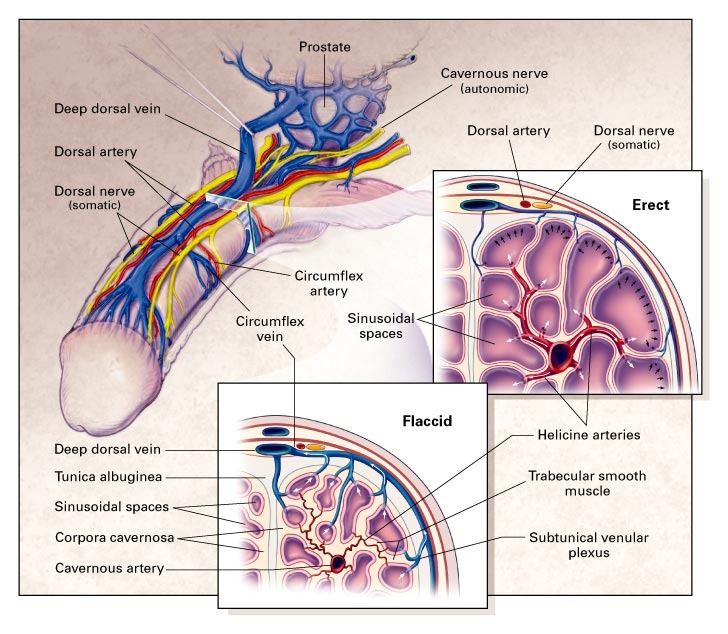Erection strength: it’s the stuff of legends, the source of endless jokes, and the bane of many men’s existence. But what is it, really? Is it some kind of superpower that only the chosen few possess? Or is it just a matter of good old-fashioned biology?
Let’s start with the basics: an erection occurs when blood flows into the penis, causing it to become engorged and firm. This process is controlled by hormones and nerve signals from the brain, which work together to relax the smooth muscle tissue in the penis and allow blood to flow in.
But what about those men who seem to have superhuman erection strength? Is it all just a matter of genetics? Well, not exactly. While it is true that some men may be more prone to stronger erections due to their genetics, there are also a number of other factors that can affect a man’s ability to maintain an erection. These include things like overall health, age, and even stress levels.
What leads to weaker erections?
There are several lifestyle factors and mineral deficiencies that can diminish erection strength in men. Some of the most common ones include:
- Stress: Stress can interfere with the production of hormones and other substances that are necessary for healthy sexual function.
- Alcohol and drug abuse: Excessive alcohol consumption and drug abuse can lead to reduced testosterone levels and impaired blood flow, which can affect erectile function.
- Lack of physical activity: A sedentary lifestyle can contribute to the development of conditions such as obesity, high blood pressure, and diabetes, which can all interfere with healthy sexual function.
- Smoking: Smoking can damage the blood vessels and impair blood flow, which can affect erectile function.
- Poor nutrition: A diet that is low in certain minerals and nutrients, such as zinc and magnesium, can contribute to sexual dysfunction.
- Sleep deprivation: Lack of sufficient sleep can affect hormone production and energy levels, which can lead to reduced sexual desire and performance.
- Chronic medical conditions: Certain medical conditions, such as heart disease, diabetes, and kidney disease, can affect blood flow and hormone production, leading to sexual dysfunction.

So, what’s a man to do if he wants to boost his erection strength? The good news is that there are plenty of things you can try to improve your chances of getting and maintaining a rock-solid erection. Exercise, for example, can help improve blood flow and boost testosterone levels, both of which can help with erections. And if you’re feeling stressed or anxious, try some relaxation techniques like deep breathing or meditation to help calm your mind and body.
But perhaps the most important thing to remember when it comes to erection strength is to not worry about it too much. Sex is supposed to be fun, after all, and worrying about your performance can actually make it harder to get and maintain an erection. So take a deep breath, relax, and let nature take its course. Your body (and your partner) will thank you.
Difference between weak erection and erectile dysfunction
Weaker erections and erectile dysfunction (ED) are similar in that they both refer to problems with achieving or maintaining an erection. However, there are some key differences between the two conditions:
- Severity: ED is a more severe condition than weaker erections. ED is defined as the inability to achieve or maintain an erection sufficient for satisfactory sexual activity. Weaker erections, on the other hand, may still be sufficient for sexual activity, but may not be as strong as they once were.
- Frequency: ED is a persistent problem that occurs consistently over time, while weaker erections may be a more sporadic issue.
- Causes: The causes of ED and weaker erections can be similar, but ED may be more likely to be caused by underlying medical conditions, such as heart disease or diabetes. Weaker erections may be more likely to be caused by lifestyle factors, such as stress or poor nutrition.
- Treatment: Treatment for ED and weaker erections may include lifestyle changes, such as quitting smoking or exercising more, as well as medications or other medical interventions. The specific treatment will depend on the underlying cause of the problem.

10 things that can improve erection strength
- Maintaining good overall health: This includes things like eating a healthy diet, exercising regularly, and managing stress.
- Getting enough sleep: Lack of sleep can affect testosterone levels, which can impact erection strength.
- Reducing alcohol and other substance intakes: While a drink or two may help relax you, excessive alcohol consumption can interfere with erections.
- Quitting smoking: Smoking can constrict blood vessels and reduce blood flow to the penis, making it more difficult to get and maintain an erection.
- Managing stress and anxiety: Stress and anxiety can interfere with the brain’s ability to send the necessary signals to the penis to cause an erection.
- Practicing relaxation techniques: Deep breathing, meditation, and other relaxation techniques can help calm the mind and body, which can improve erection strength.
- Exercising regularly: Exercise can improve blood flow and boost testosterone levels, both of which can help with erections.
- Maintaining a healthy weight: Being overweight or obese can affect hormone levels and blood flow, which can impact erection strength.
- Getting enough vitamin D: Low levels of vitamin D have been linked to erectile dysfunction.
- Using medications as directed: Some medications, such as antidepressants and blood pressure medications, can affect erection strength. If you are taking any medications, it is important to follow your healthcare provider’s instructions and discuss any concerns with them.

Erections and cardiovascular health problems
Weaker erections could be an indication of underlying health problems, particularly in the cardiovascular system. Erections are dependent on good blood flow, and if there are problems with blood flow to the penis, it can lead to weaker erections.
There are several medical conditions that can affect blood flow and lead to weaker erections, including:
- Heart disease: Narrowed or blocked arteries can reduce blood flow to the penis.
- Diabetes: Diabetes can damage the blood vessels and nerves, leading to reduced blood flow to the penis.
- High blood pressure: High blood pressure can cause damage to the blood vessels, leading to reduced blood flow.
- Obesity: Being overweight or obese can increase the risk of developing conditions such as heart disease and diabetes, which can affect blood flow.
If you are experiencing weaker erections and are concerned about your cardiovascular health, it is important to speak with a healthcare professional. They can assess your overall health and determine if there are any underlying health issues that need to be addressed.